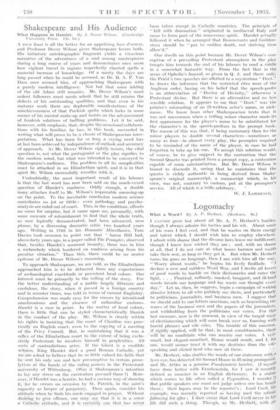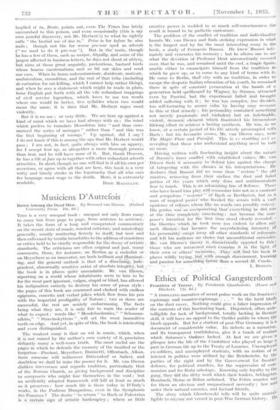Logornachy
What a Word ! By A. P. Herbert. (Methuen. Os.) I CANNOT grow hot about all Mr. A. P. Herbert's battles, though I always admire his tactics and his wit. About soine of his wars I feel cool, and that he wastes on them energy and talent which I should wish him to employ elsewhere. I admit with shame that the divorce laws leave me indifferent, though I know how wicked they are ; and, with no shame at all, that I do not care at what hours barmen and maids take their rest, so long as they get it. But when Mr. Herbert turns his guns on language, then I am with him all the Way. "Worry about words," he begins his lively fusillade. " declare a new and ruthless Word War, and I invite all lovers of good words to buckle on their dictionaries and enter the fight. . . . Piratical, ruffianly, masked, braggart, and ill-bred words invade our language and lay- waste our thought every day." Let us, then, he suggests, begin a campaign of writing abusive letters to all who publicly use them, and particularlY to politicians, journalists, and business men. I suggest that we should add to our, letters sanctions, such as boycotting ilac wares of the business men and the papers of the journalisi s, and withholding from the politicians our votes. For 110; last measure, now is the moment, in view of the turgid wave of electioneering which will soon break over us, foaming lvit horrid phrases and vile cries. The trouble of this sanction, if rigidly applied, will be that, in most constituencies, ilicre swift be no candidate who can receive our votes. A vel'Y small, but elegant-mouthed, House would result, and I, fi: • one, 'would Sooner trust' it with my destinies than the speaking and cliched herd who now sit there.
Mr. Herbert; who Studies the 'words of our statesmen with lynx eye, has detected Sir Samuel Hoare in ill-using protagon and Mr. Attlee in a genuine Frankenstein howler, (I myself have done better with Frankenstein, for I saw it rece!Iff defined as monster in an English dictionary. Is a stain(' which comes to life often called a Pygrnalion, I wonder ?) But public speakers one must not judge unless one has hearI them ; their lapses may be the reporter's ; Lord Cecil, example, was recently reported as having used I ho orlinaa following for after ; I dare swear that Lord Cecil ne,, or iii lair life did such a thing. Though, :is Mr. ;s101 implied et tu, Brute, points out, even The Times has lately succumbed to this poison, and even occasionally (this is nay own painful discovery, not Mr. Herbert's) to what he rightly calls " the bestial use of due to." Prior to for before he also nails ; though not the far worse pre-war used as adverb• (" we used to do it pre-war "). But in the main,, though he has a few of them, such as unique, liteya'lly, and some of the jargon affected in business letters, he does not shoot at sitters, but aims at those great ungainly, pretentious, bastard birds whose hoarse cacatenations now so fill our skies and rend our ears. When he hears reckcontaminate, desiderate, motivate, unilateralism, recondition, and the rest of that tribe (including de-rutisation for rat-killing, which I cannot help rather liking), and when he sees a statement which might be made in plain, terse English' put. forth with all the vile redundant trappings of civil service logorrhea, which loves to use ten words where one would be better, five syllables where two would mean the same, it is then that Mr. Herbert rages most violently.
But it is no use ; or very little. We are here up against a kind of mind which we have had always with Us ; the mind which prefers to translate Herodotus into " and thus com- menced the series of outrages " rather than " and this was the first beginning of wrongs." Up against, did I .say ? I do not know if this is among the ups that Mr. Herbert would pass ; I am not, in fact, quite always with him on uppery, for I accept beat up, as altogether a more thorough process than beat, and he will have none of it. But, thank Heaven, he has a tilt at face up to together with other redundant adverb atrocities. In short, though no one will find in it all his own pet' aversions, or agree with all that are here, this book is a very witty and timely stroke in the logoinachy that all who care for language must wage to the death. More, it is extremely



























































 Previous page
Previous page